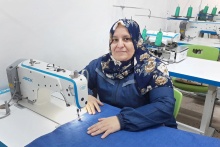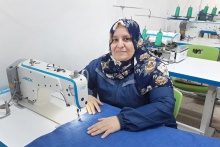When Azhar Riyati, a Jordanian woman with six children, first joined UN Women’s Oasis Centre programme, “I was afraid I wouldn’t do a good job” while juggling her family commitments, she said.
But fortunately, she found, that “interacting with staff and participants from different ages and backgrounds made me enjoy my time, overcome fears, get familiar with the equipment, and become more flexible in dealing with others”.
Riyati, who had not previously had any job outside of her home, now serves as a trainer at one of the programme’s centres, and said the tailoring skills she learned through the project helped her gain an income and develop her self-confidence.
Women rise from poverty and gain economic independence through Oasis Centres in Jordan
Since its launch in 2012, the Oasis Centres have served more than 30,000 people, predominantly Syrian refugees and vulnerable Jordanian women and their families. The programme operates 18 centres throughout Jordan in partnership with the Ministry of Social Development, and an additional four facilities in the Za’atari and Azraq refugee camps.
“The Oasis Centres offer a safe space where women voice concerns and gain positive coping strategies”, said Hadeel Qunaibi, an Oasis protection officer. “It’s more than workshops; it’s about community integration, creating an effect of empowered women equipped to face life’s responsibilities.”
The Oasis programme receives support through the EU Regional Trust Fund in Response to the Syrian Crisis, the Madad Fund, as well as the Australian Department of Foreign Affairs and Trade and the governments of Canada, Finland, France, Iceland, and Italy. Centres throughout Jordan seek to empower women and support community cohesion by bringing together Syrian refugee and Jordanian women to learn valuable skills.
In 2023, 1,624 women and 142 men were directly engaged in cash for work activities under the Oasis programme. Of those, 589 women—454 Jordanians and 135 Syrians—also completed the centres’ business training programme. According to a report conducted by UN Women’s partner Education for Employment-Jordan, some 70 per cent of those women had started business projects after graduating from the courses.
“On a professional level, I developed many skills and could earn a stable income throughout the time of the training. I could contribute to the family’s income, which made me proud”, said Layal Al-Khalaf, a 37-year-old Syrian mother of five. “The skills I gained will also help me start a business and continue generating income to support my family.”
Al-Khalaf attended workshops at an Oasis Centre in the Zaatari refugee camp, and in addition to learning practical skills she has worked as a receptionist at the centre.
“Interacting with other women at the centre was incredibly enriching as we were women with different perspectives and backgrounds”, she added. “We were all like a family and we always supported each other.”
“I recommended the programme for many women I know, so they can benefit as much as I did”, said Mariam Al-Gharableh, a Jordanian widow and mother of four. Since attending an Oasis Centre in the coastal city of Aqaba, she has her new skills to expand her small business, which creates and sells soaps, perfumes, and bags.
Riyati echoed that advice, saying she encouraged women to “Overcome their fears and get out of their comfort zone”.
“For housewives, I advise them to educate themselves, always learn something new, and try having their own business”, she said. “This will change their perception of life and the way they see things.”

